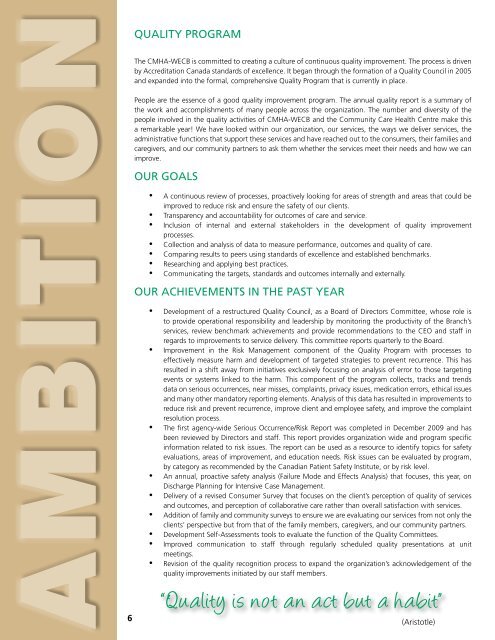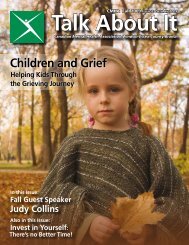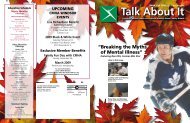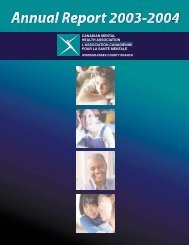2009/10 ANNUAL REPORT - Canadian Mental Health Association
2009/10 ANNUAL REPORT - Canadian Mental Health Association
2009/10 ANNUAL REPORT - Canadian Mental Health Association
Create successful ePaper yourself
Turn your PDF publications into a flip-book with our unique Google optimized e-Paper software.
AMBITION<br />
6<br />
Quality Program<br />
The CMHA-WECB is committed to creating a culture of continuous quality improvement. The process is driven<br />
by Accreditation Canada standards of excellence. It began through the formation of a Quality Council in 2005<br />
and expanded into the formal, comprehensive Quality Program that is currently in place.<br />
People are the essence of a good quality improvement program. The annual quality report is a summary of<br />
the work and accomplishments of many people across the organization. The number and diversity of the<br />
people involved in the quality activities of CMHA-WECB and the Community Care <strong>Health</strong> Centre make this<br />
a remarkable year! We have looked within our organization, our services, the ways we deliver services, the<br />
administrative functions that support these services and have reached out to the consumers, their families and<br />
caregivers, and our community partners to ask them whether the services meet their needs and how we can<br />
improve.<br />
Our Goals<br />
• A continuous review of processes, proactively looking for areas of strength and areas that could be<br />
improved to reduce risk and ensure the safety of our clients.<br />
• Transparency and accountability for outcomes of care and service.<br />
• Inclusion of internal and external stakeholders in the development of quality improvement<br />
processes.<br />
• Collection and analysis of data to measure performance, outcomes and quality of care.<br />
• Comparing results to peers using standards of excellence and established benchmarks.<br />
• Researching and applying best practices.<br />
• Communicating the targets, standards and outcomes internally and externally.<br />
Our Achievements in the Past Year<br />
• Development of a restructured Quality Council, as a Board of Directors Committee, whose role is<br />
to provide operational responsibility and leadership by monitoring the productivity of the Branch’s<br />
services, review benchmark achievements and provide recommendations to the CEO and staff in<br />
regards to improvements to service delivery. This committee reports quarterly to the Board.<br />
• Improvement in the Risk Management component of the Quality Program with processes to<br />
effectively measure harm and development of targeted strategies to prevent recurrence. This has<br />
resulted in a shift away from initiatives exclusively focusing on analysis of error to those targeting<br />
events or systems linked to the harm. This component of the program collects, tracks and trends<br />
data on serious occurrences, near misses, complaints, privacy issues, medication errors, ethical issues<br />
and many other mandatory reporting elements. Analysis of this data has resulted in improvements to<br />
reduce risk and prevent recurrence, improve client and employee safety, and improve the complaint<br />
resolution process.<br />
• The first agency-wide Serious Occurrence/Risk Report was completed in December <strong>2009</strong> and has<br />
been reviewed by Directors and staff. This report provides organization wide and program specific<br />
information related to risk issues. The report can be used as a resource to identify topics for safety<br />
evaluations, areas of improvement, and education needs. Risk issues can be evaluated by program,<br />
by category as recommended by the <strong>Canadian</strong> Patient Safety Institute, or by risk level.<br />
• An annual, proactive safety analysis (Failure Mode and Effects Analysis) that focuses, this year, on<br />
Discharge Planning for Intensive Case Management.<br />
• Delivery of a revised Consumer Survey that focuses on the client’s perception of quality of services<br />
and outcomes, and perception of collaborative care rather than overall satisfaction with services.<br />
• Addition of family and community surveys to ensure we are evaluating our services from not only the<br />
clients’ perspective but from that of the family members, caregivers, and our community partners.<br />
• Development Self-Assessments tools to evaluate the function of the Quality Committees.<br />
• Improved communication to staff through regularly scheduled quality presentations at unit<br />
meetings.<br />
• Revision of the quality recognition process to expand the organization’s acknowledgement of the<br />
quality improvements initiated by our staff members.<br />
“ Quality is not an act but a habit”<br />
(Aristotle)






